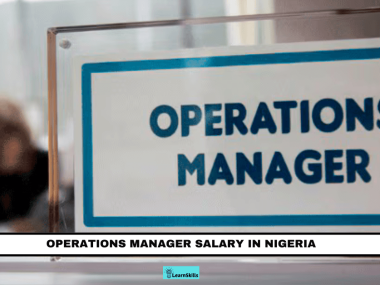If you are considering a career in the Nigeria Immigration Service, it’s essential to know what you can expect in terms of salary.
The average salary for a graduate in the Nigeria Immigration Service is around N150,000 per month, with additional allowances. This financial information is critical as you weigh your options and plan your future.
Graduates with different educational backgrounds also have varied pay scales. For example, a fresh Bachelor’s degree holder typically starts at approximately N127,000 monthly, depending on the position and years of experience.
Understanding these salary structures can help you make informed decisions about your career path in immigration.
Overview of Nigeria’s Immigration System
Nigeria’s immigration system is complex, shaped by various factors, including trends in migration and the roles of key institutions.
Nigeria Immigration Service (NIS)
The Nigeria Immigration Service (NIS) is the main body responsible for managing immigration in the country. Established in 1963, NIS aims to regulate migration, border control, and the issuance of visas and passports.
The NIS plays a key role in enforcing immigration laws and providing services to citizens and foreigners. It operates under the Ministry of Interior and has various departments focusing on different aspects of immigration.
NIS staff members, including immigration officers, receive salaries based on their rank and experience.
A newly graduated officer can earn around N134,557 per month. Salaries increase with rank and years of service, reflecting the importance of their roles in managing migration.
Migration Trends and Figures in Nigeria
Migration trends in Nigeria have shifted dramatically in recent years. Many citizens are seeking better opportunities abroad, leading to increased mass migration. Factors such as economic challenges, insecurity, and a desire for education often drive this trend.
According to recent figures, over 1.3 million Nigerians left the country in search of better prospects between 2020 and 2023.
Additionally, Nigeria has become a destination for migrants from neighboring countries and beyond. This has increased the diversity of the population and posed new challenges for the NIS in managing border security and immigration policies.
Immigration Salary Thresholds and Lists
In understanding immigration salaries, you need to know about the Immigration Salary List (ISL) and how salary thresholds are set. These factors are key in determining what you can expect in terms of salary when considering a role within the immigration framework.
Immigration Salary List (ISL)
The Immigration Salary List (ISL) provides important data regarding salaries needed for various immigration roles. This list outlines the minimum salary requirements for different job positions.
For example, the ISL may specify that a position requires a minimum salary of ₦150,000 per month for graduates in the Nigeria Immigration Service. These standards help ensure that salaries meet a baseline level, which reflects the cost of living and job responsibilities.
Determining Salary Thresholds
Salary thresholds are crucial in the immigration process. They define the minimum pay required to qualify for certain visa categories or job roles.
Factors influencing these thresholds can include sector demand, job duties, and local economic conditions.
Current Salary Thresholds:
- Graduates in Nigeria: Average ₦150,000/month
- Healthcare roles: May have different thresholds due to higher demand
By setting these salary thresholds, the government can shape labor market conditions and help protect local jobs while attracting skilled workers.
Visa Categories and Requirements
When considering immigration in Nigeria, it’s essential to understand the different visa categories that suit your situation. Knowing these categories will help you determine the right visa type and its requirements.
Student and Graduate Visa Routes
If you are a student or recent graduate, Nigeria offers specific visa options. The Student Visa allows you to study at a recognized institution. You need an acceptance letter from your school and proof of sufficient funds for your stay.
For graduates, the Graduate Visa Route may be available. This visa allows you to stay in Nigeria to look for work after completing your studies. It typically requires a degree from a Nigerian institution and proof of English proficiency.
Skilled Worker and Shortage Occupation Visas
The Skilled Worker Visa targets individuals with skills needed in Nigeria. To qualify, you must have a job offer from an employer registered with the Nigerian Immigration Service. Your job should be on the Shortage Occupation List to meet the demand for specific skills.
Requirements include proof of your qualifications and relevant work experience. You may also need to show your salary meets minimum thresholds set by the government. This visa helps fill critical roles in the country’s workforce.
Family and Dependent Visas
Family visas allow you to bring your family members to Nigeria. If you hold a visa or are a citizen, you can apply for the Dependent Family Visa for your spouse and children. This visa makes it easier for families to stay together.
To apply, you need to provide evidence of your relationship, such as marriage certificates and birth certificates for children. Each family member will require their application and meet specific health and character requirements.
These visa categories cater to diverse needs, ensuring you can find a path that applies to your situation.
Job Market for Immigrants in Nigeria
The job market for immigrants, especially for Nigerian graduates, presents various opportunities.
Opportunities for Nigerian Graduates Overseas
Many Nigerian graduates seek job opportunities abroad. Countries like Canada, the UK, and the US are popular destinations. These nations often have specific programs to attract skilled workers.
In fields like engineering, IT, and education, Nigerian graduates can find positions that meet their skills. For instance, technology jobs often offer competitive salaries and benefits. Graduates may earn between $50,000 and $80,000 annually, depending on expertise and location.
It’s essential to research visa requirements and job markets in the chosen country. Networking and online job portals can help you connect with potential employers.
Healthcare Professionals and Domestic Workers
The demand for healthcare professionals is high in Nigeria and abroad. Many countries actively seek trained nurses and doctors. For example, healthcare workers in the UK can earn an average salary ranging from £26,000 to £40,000 annually.
In addition to healthcare roles, opportunities for domestic workers exist. Many families need reliable help for childcare and household tasks.
Domestic workers in Nigeria may earn between ₦30,000 and ₦80,000 monthly. Training programs and certifications can improve your chances of getting hired. Also, proficiency in different languages can be a significant advantage.










